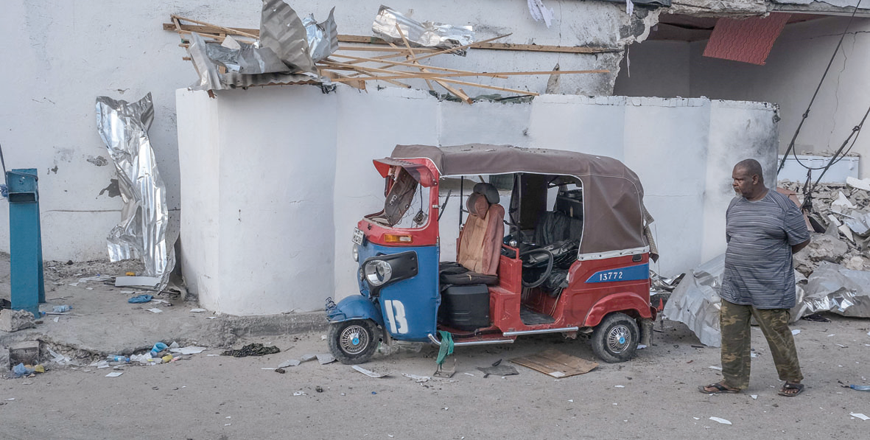You are here
Six civilians killed in Somalia hotel siege
By AFP - Jun 10,2023 - Last updated at Jun 10,2023

A man walks past a damaged tuk-tuk left outside the site of an attack at the Pearl Beach Hotel in Mogadishu on Saturday (AFP photo)
MOGADISHU — Six civilians were killed and 10 wounded in a six-hour siege by Islamist Al Shabaab militants at a beachside hotel in Somalia's capital Mogadishu, police said on Saturday.
The Al Qaeda-linked terrorists have been waging an insurgency against the internationally backed federal government for more than 15 years and have often targeted hotels, which tend to host high-ranking Somali and foreign officials.
“Six civilians were martyred in the attack... and 10 others were wounded. Three brave members of the security forces were martyred during the rescue operation,” the Somali Police Force said in a statement.
The assault, for which Al Shabaab claimed responsibility, began just before 8:00pm on Friday (17:00 GMT) when seven attackers stormed the Pearl Beach hotel, a popular spot at Lido Beach along Mogadishu’s coastline.
It ended at around 2:00am, police said, after a fierce gunfight between security forces and the militants, all of whom were killed during the battle.
“The security forces managed to rescue 84 people including women and children and elderly people,” the police statement added.
Witnesses reported hearing gunfire and explosions at the hotel on Lido beach.
“I was near the Pearl Beach restaurant when [a] heavy explosion occurred in front of the building,” one witness, Abdirahim Ali, told AFP.
“I have managed to flee but there was heavy gunfire afterwards and the security forces rushed to the area.”
Yaasin Nur was at the restaurant and told AFP it was “full of people as it was recently renovated”.
“I’m worried because there are several of my colleagues who went there and two of them are not responding to their phones,” he said.
Several ambulances were also parked nearby, an AFP journalist saw.
The attack at Lido beach underscored the endemic security problems in the Horn of Africa country as it struggles to emerge from decades of conflict and natural disasters.
Al Shabaab, which was driven out of Somalia’s main towns and cities by an African Union force, still controls large swathes of countryside and continues to carry out attacks against security and civilian targets, including in the capital.
“The attack in a popular Mogadishu neighbourhood is a bit of a shock, given that security was thought to be improving in recent weeks,” Omar Mahmood, an analyst for Eastern Africa for the International Crisis Group, told AFP. “It seems that Al-Shabaab are undertaking a series of attacks in order to slow down a possible offensive by the government and its allies.”
Last year, Somalia’s President Hassan Sheikh Mohamud launched an “all-out war” against Al Shabaab, rallying Somalis to help flush out members of the terrorist group he described as “bedbugs”.
His pledge came after 21 people were killed and 117 others were wounded in an Al Shabaab siege on a Mogadishu hotel in August 2022 that lasted 30 hours.
That attack raised serious questions about the security forces, who failed to protect a heavily guarded administrative district.
Two months later, twin car bombings in Mogadishu killed 121 people and injured 333 in the country’s deadliest attack in five years.
The army and militias known as “macawisley” have in recent months retaken swathes of territory in the centre of the country in an operation backed by the African Union mission ATMIS and US air strikes.
But Al Shabaab fighters killed 54 Ugandan peacekeepers last month in an attack on an African Union base in the southern town of Bulo Marer.
In August 2020, Al Shabaab launched a large-scale attack on the Elite, another hotel at Lido beach popular with officials, killing 10 civilians and a police officer.
It took security forces four hours to regain control of the site in that attack.
The UN said in November that at least 613 civilians had been killed and 948 injured in violence in Somalia last year, mostly caused by improvised explosive devices attributed to Al Shabaab.
The figures were the highest since 2017 and an increase of more than 30 per cent from the previous year.
Related Articles
MOGADISHU — Five people died and six others were wounded on Friday when a suicide bomber blew himself up in a restaurant near the presidenti
MOGADISHU — A suicide attack claimed by the Somali extremist militant group Al Shabaab killed at least seven people and injured nine others
AMMAN — Jordan on Saturday condemned the terrorist attack on a hotel in Somalia's Mogadishu, which resulted in many casualties and injuries.











